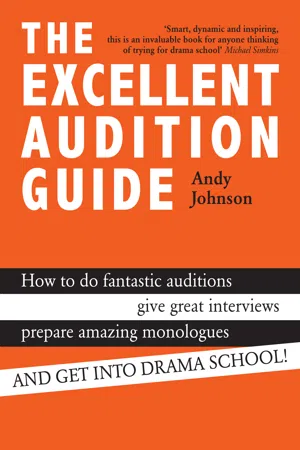
- 200 pages
- English
- ePUB (mobile friendly)
- Available on iOS & Android
The Excellent Audition Guide
About this book
An engaging, upbeat guide for any student thinking of applying to drama school. If you're thinking of applying to drama school, The Excellent Audition Guide will give you everything you need to prepare well and perform your audition to the best of your ability. Experienced actor, director and drama teacher Andy Johnson leads you through every step of the application process:
- Researching drama schools
- Writing personal statements and CVs
- Choosing and working on your speeches and songs
- Brushing up technical and vocal skills
And, of course:
- How to tackle the auditions themselves by being true to yourself and making fear your friend
A reassuring, encouraging 'how to' book that demystifies an often scary-looking process, The Excellent Audition Guide is ideal not just for applicants themselves, but also for parents, teachers and careers advisors looking to help them fulfill their acting ambitions.
'Smart, dynamic and inspiring, this is an invaluable book for anyone thinking of trying for drama school' Michael Simkins
'There's only one book in the world I would read about getting into drama school and doing good auditions. It's this one.' Vanessa Kirby ( Great Expectations, Labyrinth, Three Sisters, Jupiter Ascending )
'This book is accurate and beautifully concise. I wish Andy's written wisdom had been with me when I was applying to drama school.' Freddie Fox (Guildhall School of Music and Drama, The Judas Kiss, Hay Fever, The Mystery of Edwin Drood )
Tools to learn more effectively

Saving Books

Keyword Search

Annotating Text

Listen to it instead
Information
The Application Process
• | Find out what each school does. |
• | Find out how they work. |
• | Find out what they are looking for. |
• | Find out how their application process works. |
• | Discover what you want. |
• | Get a prospectus. |
• | Use the internet. |
• | Visit the websites. |
• | Visit the schools on open days. |
• | Go to the shows. |
• | Talk to students: ask questions. |
• | Application forms or online application account on the school site. |
• | Passport-style and/or digital photos – full-length for certain places. Increasingly, applications are being made online, so raid your Facebook… Or maybe don’t! |
• | Contact details of your referee(s) These are the people who are going to confirm things like your trainability, reliability, affability and your possibilities. |
• | Payment for the relevant amounts. To apply and/or pay online, you’ll need access to a debit or credit card. |
• | Your personal statement. |
• | An up-to-date CV (optional). |
• | Contact the school for forms, or download and print them out. |
• | Once they are completed, hold on to them until you are ready to roll. |
• | When they receive your application, they will then contact you with info regarding the audition and pieces. You will also get a date or choice of dates. |
• | Pick a date and confirm that you can attend. |
• | Go to the school website, click ‘apply online’ and then select your course. |
• | Create your user account. You may need to make sure your email spam filters are set so as not to reject correspondence from the school. |
• | Take care to fill in the application pages as they ask you to. |
• | At some point in this procedure, the school may ask for a photo to be uploaded. |
• | When you are ready, submit the application. |
• | Usually, they prompt you to pay the audition fee as you submit. |
• | They will then contact you with an audition date or a choice of dates and more info. |
Table of contents
- Cover
- Title Page
- Contents
- Dedication
- Introduction
- Part One – Application Process
- Part Two – Preparation and Attitude
- Part Three – Practical Practice
- Part Four – The Auditions: Winning Ways and Knowledge
- Appendices
- About the Author
- Copyright Information
Frequently asked questions
- Essential is ideal for learners and professionals who enjoy exploring a wide range of subjects. Access the Essential Library with 800,000+ trusted titles and best-sellers across business, personal growth, and the humanities. Includes unlimited reading time and Standard Read Aloud voice.
- Complete: Perfect for advanced learners and researchers needing full, unrestricted access. Unlock 1.4M+ books across hundreds of subjects, including academic and specialized titles. The Complete Plan also includes advanced features like Premium Read Aloud and Research Assistant.
Please note we cannot support devices running on iOS 13 and Android 7 or earlier. Learn more about using the app